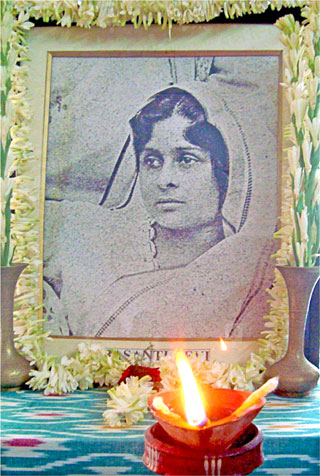History
 BASANTI DEVI
BASANTI DEVI
(23.03.1880 – 07.05.1974)
Basanti Devi College was founded by the Government of West Bengal in 1959 and became part of a cluster of colleges including Muralidhar Girls’ College (1940), Deshbandhu College (1955) and Women’s Christian College (1937), all dedicated to the education of girls from middle class families, in the Gariahat-Kalighat area. The College is named after Basanti Devi (1880-1974) who was patriot and revolutionary activist and the first Indian woman to go to jail. She was also the wife of the nationalist leader Deshbandhu Chittaranjan Das. In naming the college after her the Government of West Bengal at that time appeared to recognize women’s contribution to a free and independent India. This premier college caters to the needs of girl students from diverse class backgrounds, hailing from both the North and Southern areas of the city. Its strategic location, close to the four-point Gariahat intersection, and proximity to Ballygunge Railway Station gives it an easy accessibility to students especially from the South 24 Parganas who travel from Sonarpur and Baruipur. The college offers a wide variety of subjects allowed at the undergraduate level for both Honours and Pass by the University of Calcutta and follows its prescribed syllabi. In addition, students are made to participate in a larger program of cultural and social enhancement and empowerment.
The college regularly hosts U.G.C. seminars and conferences, human rights workshops, cultural events like Rabindra Jayanti, and motivates students to participate in self-help programmes like the NCC and NSS. Along with education the college emphasizes the importance of developing a sense of social responsibility and commitment.
The college was reaccredited (3rd cycle) by NAAC in 2018 and was awarded grade B+ (2.51 on 7-point scale) and is proud of its highly qualified faculty members who remain engaged in both teaching and research. Their commitment is borne out by the fact that many of our students are rank holders at the university level examinations. As part of our ongoing vision to enhance educational opportunities for women students from different sections of society, the college has also introduced Postgraduate (M.A.) programmes in English and Political Science from September 2013.
Introducing the college to new students gives us a moment to recollect and remember the woman patriot who gave the college her name. Basanti Devi was the daughter of Baradanath Haldar, Diwan of a large zamindary in Assam. Her life may be divided into three phases.
In the first phase, she spent her childhood under the care of her father from 1890 to 1897. She was educated at Loreto House, Calcutta, and at the age of seventeen years, she was married off to Chittaranjan Das, then an obscure barrister at the Calcutta High Court. During the next ten years she was a home-maker, managing a prosperous family, with many dependent relatives. From 1908 her husband became the most famous lawyer of Bengal; he successfully defended Aurobindo Ghose and his militant nationalist associates in the Alipore Bomb case and obtained their acquittal.
The second phase of Basanti Devi’s life began in 1917 when C.R. Das joined active politics and was elected the chairman of the Bengal Provincial Congress. That eventually led to Das’s decision to abandon the legal profession in response to Mahatma Gandhi’s call for Non-cooperation and boycott of the British courts of law in 1920. Income from legal practice ceased to flow into the family coffers and this meant a drastic change in the lifestyle of Basanti Devi’s family. She herself was totally convinced that the Non-cooperation Movement merited her support. On 2 December 1921, her political activities in support of the movement for boycott of foreign cloth led to her arrest; her sister Urmila Devi and some other women Congress workers were also arrested. There was a huge public outcry against the arrest of ladies of leading Bengali families and Basanti Devi and the others were soon released. However, C.R. Das was arrested and Basanti Devi took it upon herself to edit the Congress journal Banglar Katha while her husband was in jail. In 1922, she was elected Chairman of the Bengal Provincial Congress meeting and took prominent part in Bengal politics. This chapter of her life came to a close in 1925 when her husband suddenly passed away at the age of fiftyfive.
The third phase in Basanti Devi’s life comprises the fifty long years till her death in 1974. The death of her husband was followed by the death of their son Chiranjeet in 1926. Deeply shocked, she almost completely retired from public life. She continued to be associated with some social welfare institutions founded by her husband but her political life came to an end. Little is known of her private life in this last phase of her life except that in arranging her daughter’s marriage she boldly defied caste prejudices.

